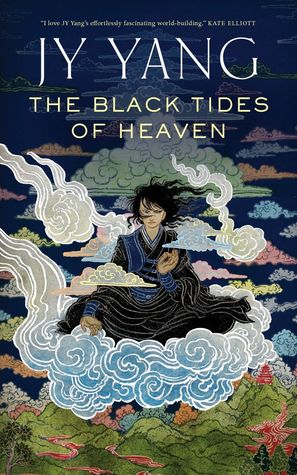After I finished Seanan McGuire's Down Among the Sticks and Bones, I really thought that that would be my top choice on the Hugo ballot for novellas. (I still have one to go, so this is all tentative.) And I still do love it a whole lot, for all the reasons I went into in the review. But then, after I'd read The Black Tides of Heaven by JY Yang, I had to sit for quite a long time with my Hugo voting document, trying to decide. In the end, I put this highest, although I'm not entirely sure I won't change my mind later. The two are that close in my mind, and both are novellas I really love.
The prose in The Black Tides of Heaven is really quite wonderful, pulling you along in the story inexorably without being in any way overwritten. This is the story of a promise made to the head of a monastery by the Protector that the next of her children could go to the monastery, and the ways in which giving birth to twins throws that promise into disarray.
Mokoya and Akeha are sent to the monastery, where they grow up. In this fantasy universe, it appears that children are considered non-binary until they declare for themselves what their gender will be, and at that point, the wielders of the magic in this world, which seems to be a relative few, will confirm that gender. Some declare early, some late, but it appears to be part of a transition to adulthood. (Or maybe I'm just conflating that part with Ann Leckie's Provenance, in which that is definitely the case.)
While there, the twins start to discover that Mokoya has prophetic dreams, dreams that cannot be altered, as they try to do just that and get into further trouble. Akeha does not seem to have any powers, but they are bold and always by Mokoya's side, the unexpected complication in the mix.
As they grow, they become more aware of the tension between the Protectorate and the monastery, and eventually, between the Protectorate and those that, in theory, it is supposed to protect. Their mother has held power for a very long time, and does not intend to ever let it go, bolstered by the magic of the Tensors, who seem to be able to manipulate the fabric of the world in various ways. (I was never really clear on the system, but didn't feel like I needed to be.)
As the two grow to adulthood, Mokoya assumes womanhood seamlessly, while it takes Akeha longer to decide/figure out that male suits him better. (I don't believe we see any characters who delay choosing indefinitely or refuse to choose.) Their mother folds them back into her sphere, against the wishes of her children or the monks.
In the background, a rebellion arises, that of the Machinists, who promote the development and use of machines so that everyone isn't dependent on the Tensorate - when magic can be made by anyone with an engine, or at least, you can get the same effects, how do you hold power? The Protector is determined to protect herself, while her children chafe under her power and ally in different ways with opposing forces. As much as they can.
While this happens, Akeha and Mokoya fall apart, as their differences and importance to their mother splinter what used to be a strong partnership. (Huh. Both my favourite novellas are about twins who pull apart.) These two find their way back together, though, and when this happens, I was nearly in tears. It's strong, a strong addition to a great story. I highly recommend this one.

No comments:
Post a Comment